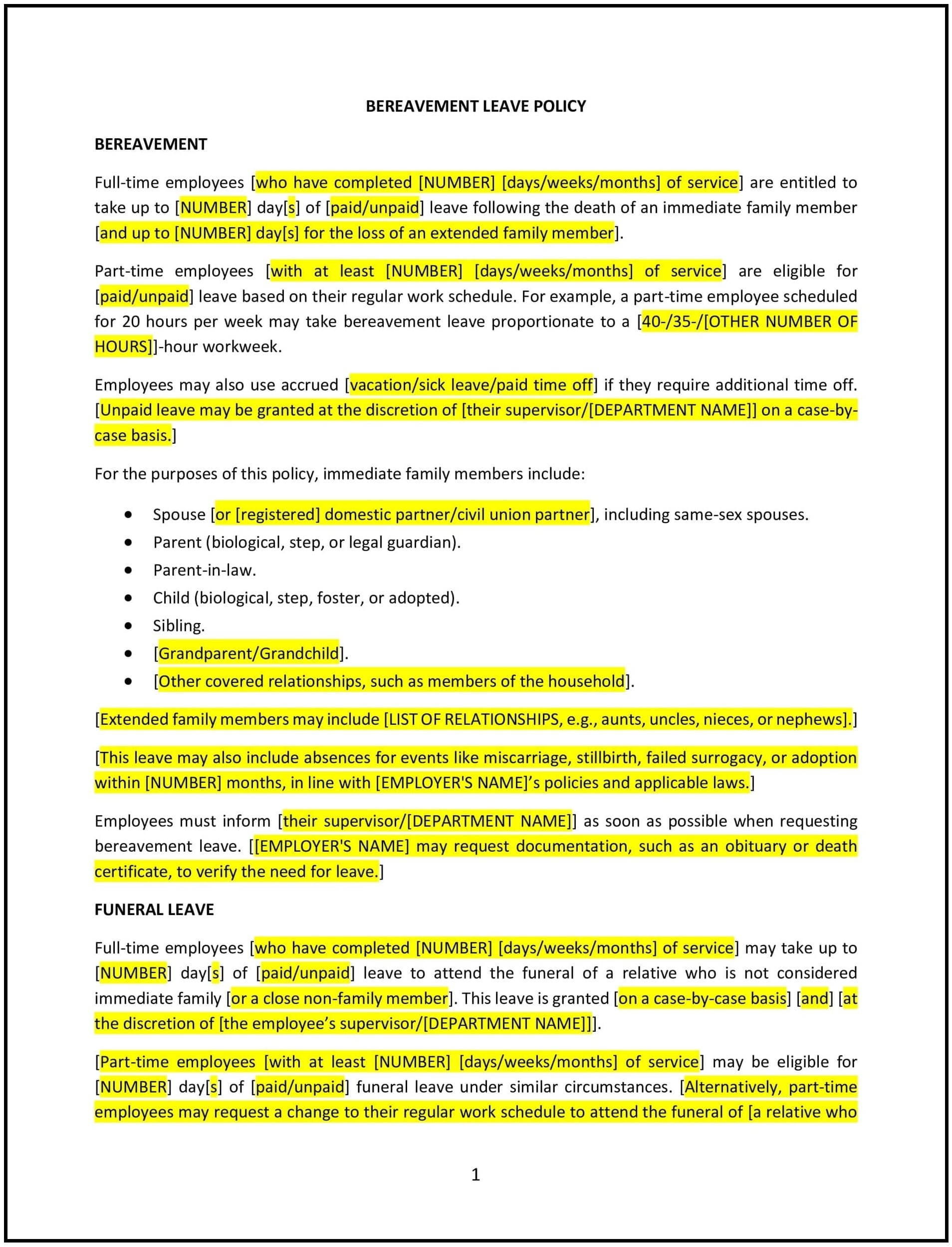Bereavement leave policy (New Hampshire): Free template
Got contracts to review? While you're here for policies, let Cobrief make contract review effortless—start your free review now.

Customize this template for free
Bereavement leave policy (New Hampshire)
A bereavement leave policy helps New Hampshire businesses establish clear guidelines for employees who need time off to grieve the loss of a loved one. This policy outlines the company’s approach to providing paid or unpaid leave during times of loss and the process for requesting bereavement leave.
By adopting this policy, businesses in New Hampshire can show compassion toward employees during difficult times while maintaining clear expectations for leave and business operations.
How to use this bereavement leave policy (New Hampshire)
- Define the eligibility for leave: Specify which family members are considered eligible for bereavement leave (e.g., immediate family members, extended family, or other significant individuals).
- Set the duration of leave: Outline the amount of time off employees are entitled to, whether it's a fixed number of days or a flexible period, and specify whether the leave will be paid or unpaid.
- Clarify leave request procedures: Define the process for requesting bereavement leave, including how much notice employees need to give, and what documentation (e.g., obituary, funeral notice) is required to validate the leave request.
- Address the impact on benefits: Explain how bereavement leave will affect employee benefits, such as whether the employee will continue to receive health insurance or accrue paid time off during the absence.
- Discuss flexible leave options: Provide employees with options to take leave in a way that suits their needs, such as consecutive days off or intermittent leave, depending on the circumstances.
- Include provisions for extending leave: Specify whether employees can extend their bereavement leave, especially in cases of complicated mourning rituals, legal matters, or other unexpected delays.
- Set expectations for returning to work: Outline any expectations regarding returning to work after the leave, such as when the employee is expected to resume their duties.
- Review and update: Regularly review the policy to ensure it aligns with New Hampshire regulations and the evolving needs of the business.
Benefits of using this bereavement leave policy (New Hampshire)
This policy provides several benefits for New Hampshire businesses:
- Shows support for employees: Demonstrates that the company cares about the well-being of its employees by offering time off during a difficult and emotional time.
- Reduces absenteeism: By providing a structured leave policy, employees can plan and manage their time off effectively, reducing unexpected disruptions to business operations.
- Promotes employee well-being: Giving employees the time they need to grieve and attend to personal matters helps to promote their overall health and well-being, which can lead to increased loyalty and job satisfaction.
- Improves workplace morale: A compassionate and supportive bereavement leave policy helps to foster a positive workplace culture, where employees feel valued and respected.
- Aligns with legal and ethical standards: Helps businesses meet New Hampshire legal requirements and industry best practices regarding employee leave for bereavement.
Tips for using this bereavement leave policy (New Hampshire)
- Communicate the policy clearly: Ensure all employees are aware of the bereavement leave policy, including the process for requesting leave and the benefits available.
- Be sensitive to employees’ needs: Approach employees with empathy and respect when they request bereavement leave, understanding that grief is a personal and emotional experience.
- Provide flexibility: Allow employees to use their leave in a way that best suits their needs, such as taking a few days off at a time or using intermittent leave for funeral-related obligations.
- Maintain confidentiality: Handle employees’ leave requests and personal information confidentially, especially regarding sensitive matters like the death of a loved one.
- Regularly review the policy: Update the policy as needed to reflect changes in New Hampshire state laws, company procedures, or employee feedback.